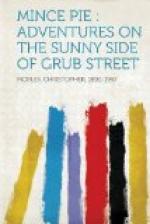Now that, I maintain, is just the kind of stuff we need in a diary of today. How fascinating that old book Peyrat’s “Pastors of the Desert” became when we learned that R.L.S. had a copy of the second volume of it in his sleeping sack when he camped out with Modestine. Even so it may be a matter of delicious interest to our grandsons to know what book Joe Hergesheimer was reading when he came in town on the local from West Chester recently, and who taught him to shoot craps. It is interesting to know what Will and Stephen Benet (those skiey fraternals) eat when they visit a Hartford Lunch; to know whether Gilbert Chesterton is really fond of dogs (as “The Flying Inn” implies, if you remember Quoodle), and whether Edwin Meade Robinson and Edwin Arlington Robinson, arcades ambo, ever write to each other. It would be interesting—indeed it would be highly entertaining—to compile a list of the free meals Vachel Lindsay has received, and to ascertain the number of times Harry Kemp has been “discovered.” It would be interesting to know how many people shudder with faint nausea (as I do) when they pick up a Dowson playlet and find it beginning with a list of characters including “A Moon Maiden” and “Pierrot,” scene set in “a glade in the Parc du Petit Trianon—a statue of Cupid—Pierrot enters with his hands full of lilies.” It would be interesting to resume the number of brazen imitations of McCrae’s “In Flanders Fields”—here is the most striking, put out on a highly illuminated card by a New York publishing firm:
Rest in peace, ye Flanders’s dead,
The poppies still blow overhead,
The larks ye heard, still
singing fly.
They sing of the cause which
made thee die.
And they are heard far down below,
Our fight is ended with the foe.
The fight for right, which
ye begun
And which ye died for, we
have won.
Rest in peace.
The man who wrote that ought to be the first man mobilized for the next war.
All such matters, with a plentiful bastinado for stupidity and swank, are the privilege of the diarist. He may indulge himself in the delightful luxury of making post-mortem enemies. He may wonder what the average reviewer thinks he means by always referring to single publishers in the plural. A note which we often see in the papers runs like this: “Soon to be issued by the Dorans (or Knopfs or Huebsches),” etc., etc. This is an echo of the old custom when there really were two or more Harpers. But as long as there is only one Doran, one Huebsch, one Knopf, it is simply idiotic.
Well, as we go sauntering along the sunny side of Grub Street, meditating an essay on the Mustache in Literature (we have shaved off our own since that man Murray Hill referred to it in the public prints as “a young hay-wagon"), we are wondering whether any of the writing men are keeping the kind of diary we should like our son to read, say in 1950. Perhaps Miss Daisy Ashford is keeping one. She has the seeing eye. Alas that Miss Daisy at nine years old was a puella unius libri.




